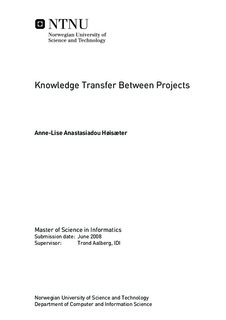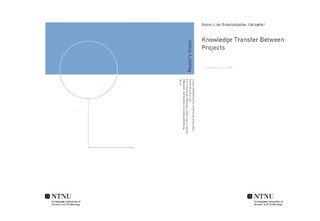| dc.contributor.advisor | Aalberg, Trond | nb_NO |
| dc.contributor.author | Høisæter, Anne-Lise Anastasiadou | nb_NO |
| dc.date.accessioned | 2014-12-19T13:33:46Z | |
| dc.date.available | 2014-12-19T13:33:46Z | |
| dc.date.created | 2010-09-04 | nb_NO |
| dc.date.issued | 2008 | nb_NO |
| dc.identifier | 348621 | nb_NO |
| dc.identifier | ntnudaim:3319 | nb_NO |
| dc.identifier.uri | http://hdl.handle.net/11250/251259 | |
| dc.description.abstract | The practice of knowledge management in organizations is an issue that has recieved increasing attention during the last 20 years. This focus on knowledge management has also reached the public sector in Norway. Since 2001 the Directorate of Taxes has shown an interest in adopting methods and technologies to improve management of knowledge especially through the use of technology. This thesis aims to evaluate the current transfer of knowledge between projects in the Directorate of Taxes IT and service partner. The thesis also suggests and evaluates an approach for knowledge transfer based on two tools, the post mortem analysis and the wiki. I wish to show how this approach, based on one technical tool and one non-technical, covers all stages of the knowledge transfer process and helps the organization create and retain their knowledge. To examine the current situation of knowledge transfer in the Directorate of Taxes and to evaluate the suggested approach for knowledge transfer data was collected in six different stages. In spring 2007 I observed a meeting of project managers which provided me with information on how knowledge transfer is done on the managerial level. Documents that are used in project work were studied throughout the fall of 2007 to learn more about what project work consists of and what routines they have around the work. In late fall 2007 I conducted 8 interviews with employees at the Directorate of Taxes. I enquired about the use of the documents and meetings, and about other routines and practices concerning knowledge transfer. I also asked the employees about what they expected and desired from a potential new approach of knowledge transfer and what they thought of using the two tools that constitute my approach. In spring 2008 I observed the execution of a post mortem analysis and interviewed the participants afterwards. This gave me new insight as to how the tool works and how the employees of the organization respond to it. I studied documents containing previous research done on organizational learning at the Directorate of Taxes, and gained insight on the organization from the perspective of others. I also used the findings from this research to evaluate the suitability of the two tools. I learnt that the project members at the Directorate of Taxes chiefly transfer knowledge directly through people by a so called open-door-policy, where people are encouraged to seek and give help when they need it, face-to-face. There are some problems with this method including that it can be hard to find the right people and it is open for constant interruptions. At the managerial level sporadic meetings are conducted where knowledge is transferred, but problems with this method include that they are low in attendance and that the knowledge shared is not optimal. The third attempt of knowledge transfer reported is the use documents and templates. The Directorate of Taxes spends time and resources trying to transfer knowledge through the documents, but there are no routines around their use. The two interview sessions and the execution of the post mortem analysis show promising results for the suggested approach. The interviewees and participants of the post mortem analysis were very positive to the adoption of the method. There are however some employees who are skeptical to the suitability of the post mortem analysis and to using an electronic system for knowledge transfer. The organization has to make sure that it has its employees on board when taking these methods into use if they are to be successful. | nb_NO |
| dc.language | eng | nb_NO |
| dc.publisher | Institutt for datateknikk og informasjonsvitenskap | nb_NO |
| dc.subject | ntnudaim | no_NO |
| dc.subject | MIT informatikk | no_NO |
| dc.subject | Informasjonsforvaltning | no_NO |
| dc.title | Knowledge Transfer Between Projects | nb_NO |
| dc.type | Master thesis | nb_NO |
| dc.source.pagenumber | 91 | nb_NO |
| dc.contributor.department | Norges teknisk-naturvitenskapelige universitet, Fakultet for informasjonsteknologi, matematikk og elektroteknikk, Institutt for datateknikk og informasjonsvitenskap | nb_NO |

